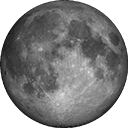Current Moon Phase

Full Moon The moon is currently in Scorpio The moon is 15 days old
Distance: 62 earth radii
Ecliptic latitude: -2 degrees
Ecliptic longitude: 220 degrees-
Category Archives: Astronomy Facts
Mars at Opposition: The Best View of Mars on March 3
Saturday, March 3, 2012 is a date to mark on your calendar. This is the day when Mars will be in opposition with the earth. When such a position occurs, it is very easy to see planet Mars in the … Continue reading
Posted in Astronomy Facts, Astrophotography, Planets
Tagged best observation time, Mars opposition
Comments Off on Mars at Opposition: The Best View of Mars on March 3
Best Chance to See Mercury
The “elusive” planet will no longer be elusive in the coming days. As a matter of fact, you have the best time to see planet Mercury from February 20th all the way to March 12th – that is if all … Continue reading
Posted in Astronomy Facts, Planets, Space News
Tagged best observation time, Mercury
Comments Off on Best Chance to See Mercury
EXO-PLANETS – ONE STEP CLOSER TO THE DISCOVERY OF LIFE OUTSIDE OUR SOLAR SYSTEM
An Extrasolar planet also called Exoplanet is defined basically as a planet, outside our solar system, which revolves around a star (like our Sun). As of July 31, 2009 there are exactly 357 exoplanets listed in Extrasolar planet Encyclopedia. How … Continue reading
Posted in Astronomy Facts
Tagged Circumstellar discs, Eclipsing Binary, Exoplanets, Gravitational Microlensing, Orbital phase, Polarimetry, Pulsar Timing, Radial Velocity, Transit Method
Comments Off on EXO-PLANETS – ONE STEP CLOSER TO THE DISCOVERY OF LIFE OUTSIDE OUR SOLAR SYSTEM
WHEN WILL MAN GO TO MOON AGAIN?
Let us start from the beginning of this well known “Space Race”. This so called, analogy to arms race, was an informal competition between United States and Soviet Union to see who could outrun each other in advancements in space … Continue reading
Posted in Astronomy Facts, Human Space Flight
Tagged man on moon, manned space exploration, Moon, space race
Comments Off on WHEN WILL MAN GO TO MOON AGAIN?
TRIPLE ECLIPSE – An Extremely Rare Astronomical Event
The Triple eclipse was seen with a beginning of a lunar eclipse on July 7th, succeeded by a solar eclipse on July 22nd, and will be topped off with another lunar eclipse on August 7th. Some of the world’s leading … Continue reading
Posted in Astronomy Facts
Tagged Astrology, humbug, Lunar eclipse, Solar eclipse, Triple Eclipse
Comments Off on TRIPLE ECLIPSE – An Extremely Rare Astronomical Event
Gone are the dark clouds that made “Hubble” blind….
Astronauts from the Atlantis on Thursday gifted the Hubble Space Telescope with a deeper insight into the universe in the form of a new farsightedness-special camera eye during the arduous spacewalks to fix the renowned observatory. It gives Hubble the … Continue reading
Posted in Astronomy Facts, astronomy pictures, Space News, Telescopes
Tagged beginning of the universe, far sight, hubble
Comments Off on Gone are the dark clouds that made “Hubble” blind….
The degenerating dwarf
The term White Dwarf was first coined by Willem Luyten. A white dwarf also known as degenerate dwarf is a small star composed mostly of electron-degenerate matter. It has mass comparable to that of the Sun and, its volume is … Continue reading
Posted in Astronomy Facts
Tagged degenerate matter, gravity compression, white dwarfs
Comments Off on The degenerating dwarf
The black void that fills the Universe (black holes)
Often considered as cosmic vacuum cleaners, black holes are much more mysterious as well as interesting, captivating minds of both scientists as well as common people. In fact, they are the evolutionary end point of massive stars. To gain more … Continue reading
Posted in Astronomy Facts
Tagged black hole, infinite density, Schwarzschild radius
Comments Off on The black void that fills the Universe (black holes)
All about Neutron stars and Pulsars
Neutron star Neutron stars are a type of remnant that can result from the gravitational collapse of a massive star during a Type II, Type 1b or Type 1c supernova event. They are almost entirely comprised of neutrons and hence … Continue reading
Posted in Astronomy Facts
Tagged emit radiation, Neutron star, pulsar
Comments Off on All about Neutron stars and Pulsars
The Origin and Extent Of The Universe
There are several theories involving the conception of the universe. Out of the various theories the one which got strongly established is that of the Big Bang theory. According to this theory, universe began due to a tremendous explosion from … Continue reading
Posted in Astronomy Facts
Tagged age of the universe, Big bang, extent of the universe, size of the universe
Comments Off on The Origin and Extent Of The Universe
